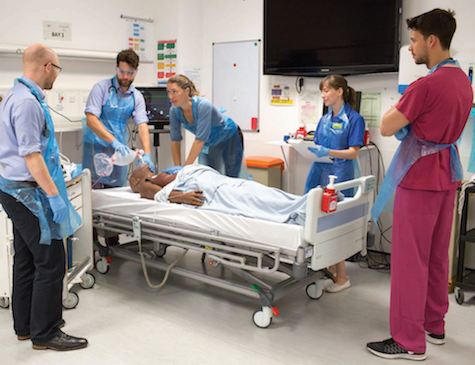Exploring Nursing Case Studies: Learning from Real-Life Scenarios
Intoduction
Nursing case studies serve as invaluable educational tools, offering insights into real-life clinical scenarios, patient interactions, and decision-making processes. Through the analysis of these case studies, nursing students and professionals alike can enhance their critical thinking skills, clinical reasoning abilities, and ethical understanding, ultimately improving the quality of patient care. In this exploration of nursing case studies, we will delve into various scenarios, examining the challenges, complexities, and lessons learned from each case.
Managing Chronic Disease
Mrs. Smith, a 65-year-old woman with a history of diabetes and hypertension, presents to the clinic with complaints of fatigue, increased thirst, and frequent urination. Upon assessment, her blood glucose levels are found to be elevated, indicating poorly controlled diabetes. As her primary care nurse, the challenge lies in developing a comprehensive care plan to manage her chronic conditions effectively while addressing her symptoms and concerns.
The nursing process is employed to assess Mrs. Smith’s current health status, identify risk factors and complications associated with uncontrolled diabetes, and formulate a tailored care plan. This includes monitoring her blood glucose levels, providing education on diet and exercise, administering medications as prescribed, and coordinating referrals to other healthcare professionals such as dietitians and diabetes educators.
Furthermore, the nurse collaborates with Mrs. Smith to set realistic goals and empower her to take an active role in managing her health. This involves discussing lifestyle modifications, adherence to medication regimens, and strategies for monitoring and preventing complications. By fostering open communication and mutual trust, the nurse establishes a therapeutic relationship that supports Mrs. Smith’s journey towards optimal health and well-being.
Ethical Dilemmas in End-of-Life Care
Mr. Johnson, a 75-year-old man with advanced dementia, is admitted to the hospital with pneumonia and respiratory distress. Despite aggressive treatment measures, his condition continues to deteriorate, and his family is faced with the difficult decision of whether to continue life-sustaining interventions or transition to palliative care. As the nurse caring for Mr. Johnson, navigating this ethical dilemma requires sensitivity, compassion, and respect for his autonomy and wishes.
The nurse engages in open and honest communication with Mr. Johnson’s family, providing information about his prognosis, treatment options, and potential outcomes. This includes discussing the benefits and burdens of continuing life support measures versus transitioning to comfort-focused care, taking into account Mr. Johnson’s quality of life, values, and preferences.
Additionally, the nurse collaborates with the healthcare team, including physicians, social workers, and spiritual care providers, to ensure that Mr. Johnson’s care aligns with his goals and wishes. This may involve facilitating advance care planning discussions, documenting his preferences in an advance directive or Physician Orders for Life-Sustaining Treatment (POLST) form, and advocating for his dignity and comfort during the end-of-life process.
Throughout this challenging time, the nurse provides emotional support and guidance to Mr. Johnson’s family, acknowledging their grief, uncertainty, and need for closure. By fostering a supportive and empathetic environment, the nurse helps facilitate a peaceful and dignified transition for Mr. Johnson and his loved ones, honoring their wishes and upholding the principles of beneficence, non-maleficence, and respect for autonomy in end-of-life care.
Addressing Cultural Competence in Patient Care
Ms. Chen, a 40-year-old immigrant from China, presents to the emergency department with symptoms of chest pain and shortness of breath. As her nurse, the challenge lies in providing culturally competent care that respects her beliefs, values, and traditions while addressing her medical needs effectively.
The nurse begins by conducting a cultural assessment to gain insight into Ms. Chen’s cultural background, language preferences, and health beliefs. This includes exploring her understanding of illness and wellness, perceptions of healthcare providers, and attitudes towards treatment modalities.
Based on the cultural assessment findings, the nurse adapts the care plan to accommodate Ms. Chen’s cultural preferences and needs. This may involve using interpretation services to facilitate communication, incorporating traditional healing practices or dietary restrictions into her treatment plan, and involving her family or community members in decision-making processes.
Furthermore, the nurse engages in self-reflection and ongoing education to enhance cultural competence and sensitivity in nursing practice. This includes attending cultural competency training sessions, seeking guidance from multicultural resources, and reflecting on personal biases and assumptions that may impact patient care.
By embracing cultural competence principles, the nurse fosters trust, respect, and collaboration with Ms. Chen and her family, promoting positive health outcomes and enhancing the quality of the patient experience. This case highlights the importance of cultural humility, open-mindedness, and willingness to learn and adapt in providing patient-centered care that honors diversity and promotes health equity.
Interprofessional Collaboration in Complex Care
Mr. Patel, a 55-year-old man with end-stage renal disease, diabetes, and peripheral vascular disease, is admitted to the hospital with a diabetic foot ulcer and acute kidney injury. As his nurse, the challenge lies in coordinating care across multiple disciplines to address his complex medical needs and prevent further complications.
The nurse collaborates closely with the interprofessional healthcare team, including physicians, wound care specialists, nephrologists, dietitians, and physical therapists, to develop a comprehensive care plan tailored to Mr. Patel’s unique needs and goals. This involves regular interdisciplinary team meetings, communication exchanges, and care coordination efforts to ensure continuity and coherence in his treatment.
Furthermore, the nurse engages Mr. Patel as an active participant in his care, providing education on self-management strategies, medication adherence, wound care techniques, and lifestyle modifications. By empowering him to take ownership of his health and make informed decisions, the nurse promotes autonomy, self-efficacy, and patient engagement in the healing process.
Throughout Mr. Patel’s hospitalization, the nurse serves as a patient advocate, addressing his concerns, advocating for his preferences, and ensuring that his voice is heard in care planning and decision-making processes. By fostering open communication, trust, and mutual respect among all members of the healthcare team, the nurse promotes collaborative practice and synergistic outcomes in the delivery of patient-centered care.
Nursing case studies provide invaluable opportunities for learning, reflection, and professional growth, offering insights into the complexities, challenges, and rewards of nursing practice. By examining real-life scenarios and applying the nursing process, ethical principles, and evidence-based practice guidelines, nurses can enhance their clinical skills, critical thinking abilities, and compassionate care delivery.
Moreover, nursing case studies serve as catalysts for dialogue, collaboration, and innovation in healthcare, inspiring nurses to explore new approaches, strategies, and solutions to address emerging health challenges and promote positive patient outcomes. Through continuous learning, self-reflection, and commitment to excellence, nurses can strive to uphold the highest standards of care and make meaningful contributions to the health and well-being of individuals, families, and communities worldwide.
Managing Acute Pain in Postoperative Patients
Mrs. Jackson, a 60-year-old woman, undergoes abdominal surgery for the removal of a tumor. Following the procedure, she experiences severe postoperative pain, which requires effective pain management to facilitate recovery and enhance her comfort. As her nurse, the challenge lies in assessing and managing Mrs. Jackson’s pain while minimizing the risk of adverse effects and optimizing her overall recovery.
The nurse conducts a thorough pain assessment, utilizing validated pain scales and patient-reported indicators to evaluate the intensity, location, and quality of Mrs. Jackson’s pain. Additionally, the nurse considers factors such as her medical history, allergies, and previous experiences with pain management to tailor an individualized pain management plan.
The pain management plan may include a combination of pharmacological and non-pharmacological interventions, such as analgesic medications, patient-controlled analgesia (PCA) devices, nerve blocks, relaxation techniques, and therapeutic exercises. The nurse collaborates with the healthcare team to ensure that Mrs. Jackson receives timely and appropriate interventions to address her pain effectively.
Furthermore, the nurse provides education to Mrs. Jackson and her family on pain management strategies, including medication administration, side effects to watch for, and the importance of reporting changes in pain levels promptly. By empowering Mrs. Jackson to participate in her pain management plan, the nurse promotes active engagement and self-care, fostering a sense of control and agency in her recovery process.
Throughout Mrs. Jackson’s recovery, the nurse monitors her pain levels closely, reassesses her pain management needs regularly, and adjusts the treatment plan as necessary to optimize her comfort and functional status. By employing a multidisciplinary approach that addresses the physical, emotional, and psychosocial aspects of pain, the nurse plays a vital role in promoting Mrs. Jackson’s recovery and well-being.
Preventing Healthcare-Associated Infections
Mr. Garcia, a 70-year-old man, is admitted to the hospital for elective knee replacement surgery. As his nurse, the challenge lies in implementing evidence-based infection prevention strategies to minimize the risk of healthcare-associated infections (HAIs) and promote Mr. Garcia’s safety and recovery.
The nurse follows established infection control protocols and best practices, including hand hygiene, aseptic technique, and environmental cleaning, to reduce the transmission of pathogens and prevent surgical site infections (SSIs) and other HAIs. This involves adhering to strict handwashing protocols, wearing personal protective equipment (PPE), and maintaining a clean and hygienic environment around Mr. Garcia’s bedside.
Additionally, the nurse collaborates with the surgical team to ensure that appropriate preoperative prophylactic antibiotics are administered in accordance with established guidelines and timing protocols. The nurse also monitors Mr. Garcia’s surgical incision site closely for signs of infection, such as redness, swelling, warmth, or drainage, and reports any abnormalities promptly for further evaluation and intervention.
Furthermore, the nurse provides education to Mr. Garcia and his family on infection prevention measures, including proper wound care, signs and symptoms of infection, and strategies to minimize the risk of HAIs during his hospitalization and recovery. By promoting awareness and adherence to infection control protocols, the nurse empowers Mr. Garcia and his caregivers to take an active role in preventing complications and promoting optimal outcomes.
Throughout Mr. Garcia’s hospitalization, the nurse remains vigilant in implementing infection prevention strategies, advocating for adherence to best practices, and addressing any lapses or deficiencies in infection control protocols. By prioritizing patient safety and quality of care, the nurse plays a critical role in minimizing the risk of HAIs and promoting positive patient outcomes in the perioperative setting.
Nursing case studies offer rich opportunities for learning, growth, and professional development, providing insights into the complexities, challenges, and rewards of nursing practice across diverse clinical settings and patient populations. By examining real-life scenarios and applying evidence-based practice guidelines, ethical principles, and interdisciplinary collaboration, nurses can enhance their clinical skills, critical thinking abilities, and compassionate care delivery.
Moreover, nursing case studies serve as catalysts for innovation, quality improvement, and advancement in healthcare, inspiring nurses to explore new approaches, strategies, and solutions to address emerging health challenges and promote positive patient outcomes. Through continuous learning, self-reflection, and commitment to excellence, nurses can strive to uphold the highest standards of care and make meaningful contributions to the health and well-being of individuals, families, and communities worldwide.
Supporting Mental Health in Adolescents
Sarah, a 16-year-old high school student, is referred to the school nurse by her teacher due to concerns about her declining academic performance, social withdrawal, and changes in behavior. As her school nurse, the challenge lies in assessing Sarah’s mental health needs, providing appropriate support and interventions, and collaborating with other healthcare professionals and school personnel to promote her well-being.
The nurse begins by conducting a comprehensive assessment of Sarah’s mental health, utilizing validated screening tools, and open-ended questioning to explore her thoughts, feelings, and experiences. This includes assessing for symptoms of depression, anxiety, trauma, and other mental health conditions, as well as identifying potential stressors and risk factors in Sarah’s life.
Based on the assessment findings, the nurse collaborates with Sarah, her parents, teachers, and school counselors to develop a holistic care plan that addresses her mental health needs within the context of her school and community. This may involve referrals to mental health professionals for further evaluation and treatment, implementing accommodations or support services to address academic challenges, and facilitating access to community resources and support networks.
Furthermore, the nurse provides education and guidance to Sarah and her support system on mental health literacy, coping strategies, and self-care techniques. By empowering Sarah to recognize and manage her emotions, build resilience, and seek help when needed, the nurse promotes autonomy, self-efficacy, and empowerment in her mental health journey.
Throughout the process, the nurse serves as a trusted advocate and resource for Sarah, advocating for her needs, rights, and preferences, and fostering a safe and supportive environment where she feels heard, valued, and respected. By fostering collaboration and coordination among key stakeholders, the nurse promotes a multidisciplinary approach to supporting Sarah’s mental health and well-being, both in the school setting and beyond.
Promoting Healthy Aging in Older Adults
Mr. Thompson, an 80-year-old man, is admitted to a long-term care facility following a stroke that left him with residual weakness and functional limitations. As his nurse, the challenge lies in providing comprehensive geriatric care that promotes Mr. Thompson’s health, independence, and quality of life while addressing his complex medical and psychosocial needs.
The nurse conducts a thorough assessment of Mr. Thompson’s physical, cognitive, and psychosocial functioning, utilizing standardized tools and observation to identify areas of strength, impairment, and potential risk. This includes assessing his mobility, cognition, nutrition, medication management, social support, and environmental safety factors.
Based on the assessment findings, the nurse collaborates with the interdisciplinary healthcare team, including physicians, physical therapists, occupational therapists, social workers, and dietitians, to develop an individualized care plan that addresses Mr. Thompson’s unique needs and goals. This may involve implementing rehabilitation interventions to improve his mobility and functional independence, optimizing his medication regimen to manage stroke-related complications, and providing support services to enhance his social engagement and emotional well-being.
Furthermore, the nurse engages Mr. Thompson and his family in care planning and decision-making processes, fostering open communication, shared decision-making, and mutual respect. By involving Mr. Thompson as an active participant in his care, the nurse promotes autonomy, dignity, and person-centered care that honors his preferences, values, and priorities.
Throughout Mr. Thompson’s stay at the long-term care facility, the nurse monitors his progress closely, reassesses his needs regularly, and adjusts the care plan as necessary to optimize his health, functional status, and overall well-being. By providing holistic, coordinated, and compassionate care, the nurse plays a vital role in promoting healthy aging and enhancing the quality of life for older adults like Mr. Thompson.
Nursing case studies offer valuable insights into the complexities, challenges, and rewards of nursing practice across diverse patient populations and healthcare settings. By examining real-life scenarios and applying evidence-based practice guidelines, ethical principles, and interdisciplinary collaboration, nurses can enhance their clinical skills, critical thinking abilities, and compassionate care delivery.
Moreover, nursing case studies serve as catalysts for innovation, quality improvement, and advancement in healthcare, inspiring nurses to explore new approaches, strategies, and solutions to address emerging health challenges and promote positive patient outcomes. Through continuous learning, self-reflection, and commitment to excellence, nurses can strive to uphold the highest standards of care and make meaningful contributions to the health and well-being of individuals, families, and communities worldwide.
Transitioning Care for Pediatric Patients with Chronic Conditions
Emily is a 12-year-old girl with cystic fibrosis who has been receiving care at a pediatric hospital since infancy. As she approaches adolescence, the challenge arises in transitioning her care from pediatric to adult healthcare services while ensuring continuity, quality, and patient-centeredness.
The nurse initiates discussions about transition planning early in Emily’s care journey, involving her and her family in the process to facilitate understanding, acceptance, and preparation. This involves providing education on the importance of transition, addressing fears or concerns, and identifying goals and expectations for the transition process.
The nurse collaborates with Emily’s multidisciplinary care team, including pediatricians, pulmonologists, nurses, social workers, and transition coordinators, to develop a comprehensive transition plan tailored to her individual needs, preferences, and developmental stage. This may involve gradually introducing her to adult healthcare providers, services, and settings, facilitating the transfer of medical records and treatment plans, and addressing psychosocial and logistical barriers to care continuity.
Addressing Social Determinants of Health in Underserved Communities
Maria is a 45-year-old immigrant woman living in a low-income neighborhood with limited access to healthcare resources. She presents to the community health clinic with complaints of chronic pain, fatigue, and depression, highlighting the challenge of addressing social determinants of health in underserved populations.
The nurse conducts a comprehensive assessment of Maria’s social determinants of health, including socioeconomic status, housing stability, access to healthcare, food security, social support networks, and cultural barriers to care. This involves using screening tools, community resources, and cultural competence to identify underlying factors contributing to Maria’s health disparities.
Conclusion
Nursing case studies offer valuable insights into the complexities, challenges, and opportunities of nursing practice across diverse patient populations and healthcare settings. By examining real-life scenarios and applying evidence-based practice guidelines, ethical principles, and interdisciplinary collaboration, nurses can enhance their clinical skills, critical thinking abilities, and compassionate care delivery.



